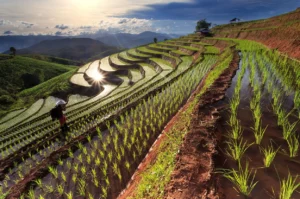
It was one of those magic moments when Rajat M. Nag wished he had a camera. Bubbling with enthusiasm, two youngsters were taking delight in demonstrating the basics of computer use to their parents. But for Mr. Nag, who is director general of the Mekong Department of the Asian Development Bank, this heart-warming scene went way beyond cute.
The room was not a comfortable, well-appointed den, but one of the cramped, spartan Internet cafés that dot the roadside in the impoverished rice-growing expanses of northeastern Thailand. What intrigued Mr. Nag most was what the kids had up. Not for them the digital mayhem of the latest computer game. On their screen were pages from Rice Doctor, a diagnostic program developed by IRRI scientists to help rice farmers manage the pests and diseases that attack their crops. The kids were translating the relevant pages of Rice Doctor into Thai for their parents. Farmers will benefit “I loved hearing this story,” says Mark Bell, the head of the Training Center at IRRI. “It demonstrates that, although very few poor rice farmers can use a computer or have access to one, if you make information available on the Internet, chances are many farmers will benefit in some way.”
To be sure, rice knowledge rarely flows this directly from IRRI to farmers. The institute focuses its training and other knowledge dissemination efforts on the staff members of national agricultural research and extension system (NARES) and other partners that run extension services. In other words, IRRI trains trainers, who then adapt institute research methods and recommendations to local conditions and relay them to farmers. That said, one of the hardest challenges in agricultural development remains, as always, the timely and effective transfer of technologies from the research laboratory to farmers’ fields.
All too often, new technologies are successfully developed only to fail to reach those who need them most – the farmers – because of poor communication. Even worse, potentially valuable technologies that languish unused can become forgotten and permanently lost. Meanwhile, NGOs have begun to play an important role in extension, but few have the resources or expertise to develop their own technologies. Only with access to technologies developed by scientists in institutes like IRRI can they hope to achieve impact.
Into the yawning gap between research and impact has stepped the Rice Knowledge Bank. This is the world’s first comprehensive, digital library of training materials on rice farming and one of the first digital extension services for those who work with poor farmers. What is more, the wealth of information on rice production and training in the Rice Knowledge Bank – which, of course, includes Rice Doctor – continues to grow with new contributions made by scientists and educators from IRRI and elsewhere.







